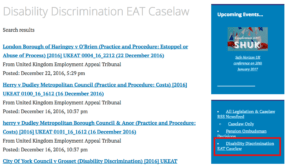President Franklin D. Roosevelt would not travel on the 13th day of any month and would never host 13 guests at a meal. Napoleon and President Herbert Hoover were also triskaidekaphobic, with an abnormal fear of the number 13.
– Unknown
Friday the 13th, considered by many as one of the unluckiest days of the year, was upon us yesterday. We published this post:
Proportionate Means of Achieving a Legitimate Aim
For those HR professionals that took the decision to stay tucked up in bed all day to avoid any potential Friday the 13th bad luck that may come their way, or alternatively, locked themselves in their drab hermetic-sealed office to ignore the superstitious chatter, we are giving them a second chance to embrace the Equality Act 2010 (EqA).
There will be those who administer the police injury Regulations – those indefatigable HR professionals that braved their fears yesterday and faced Friday 13th head on – who may have read the above post but still have the asinine view that the EqA does not apply to them: You know the sort! their mantra, oft repeated, is … “we have a statutory duty… dontcha know! Anyway these medically retired officers have left – they can’t touch us with equality law“.
Oh dear. How wrong can they be?
Dear reader, let us introduce you to the Court of Appeal decisions of Jessemey v Rowstock Ltd & Anor [2014] and Onu v Akwiwu & Anor [2014].
The Court of Appeal handed down these two judgements setting out important points of principle in equality law. In Jessemey v Rowstock Ltd & Anor [2014] (an age discrimination case) , heard alongside the conjoined appeals in Onu v Akwiwu & Anor [2014] (race discrimination case), the court found that the EqA does cover post-employment victimisation.
The EqA does provide for claims of post-employment victimisation, as required by the Equal Treatment Framework Directive (2000/78/EC), the Race Directive (2000/43/EC) and the European Court of Justice.
Post-termination protection is conferred by Section 108 of the Equality Act 2010 and that section applies only where a relationship has previously existed between the parties. For instance, the relationship between a police force and those it medically retired!
In particular, the Court of Appeal took into account:
- – at the time the act was drafted, post-employment victimisation was unlawful (Rhys-Harper v Relaxion Group plc);
- – there was nothing suggesting that the government intended to change to law and remove this protection;
- – the Act’s explanatory notes suggested that post-employment victimisation was to be covered;
- – if it was not covered, the UK would be in breach of EU law; and
- – there is no rational basis for treating post-employment victimisation differently from post-termination discrimination and harassment.
Those not aligned with this truth are operating on a wrong perception of reality.
Coherence and internal logic are not notable attributes of the Friday 13th superstitions. Just like the film franchise series of the same name getting sillier and sillier, the failure of police forces to grasp their duty and to consider the EqA when dealing with those with injury awards will lead them into their own world of never-ending horror sequels.






Latest Blog Comments